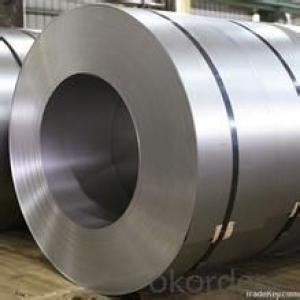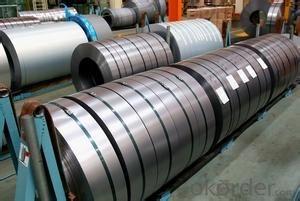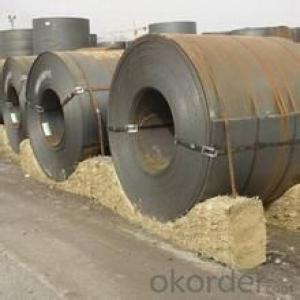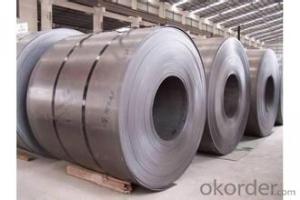Stainless Steel Coil/Sheet/Strip/Sheet /Stainless Steel Coil/Sheet/Strip/Sheet
- Loading Port:
- Shanghai
- Payment Terms:
- TT OR LC
- Min Order Qty:
- 100 m.t.
- Supply Capability:
- 500000 m.t./month
OKorder Service Pledge
OKorder Financial Service
You Might Also Like
Rolled to its final dimensions while it’s hot enough to scale, our hot-rolled steel is an amalgamation of the various qualities of steel. It can be in the form of plates, sheets and coils. Our Hot-Rolled Steel Sheets and Coils are applied to a wide range of uses such as automobile, electrical appliance, machinery manufacturing, container manufacturing, shipbuilding, bridge, pipeline, and receive high acclaim from our customers for its excellent quality.
Product Description:
Hot Rolled Stainless Steel Coil 304 Annealing and Pickling No.1 Finish
Stainless steel is a production which not easy rust,acid resistance and corrosion resistance,so it is widely
used in light industry,heavy industry,daily necessities and the decoration industry.
Hot Rolled Stainless Steel Coil 304 Physical Properties
Tensile strength σb (MPa) ≥ 520
the conditions yield strength σ0.2 (MPa) ≥ 205,
elongation δ5 (%) ≥ 40
Reduction of ψ (%) ≥ 50,
hardness: ≤ 187
HB; ≤ 90
HRB; ≤ 200H
We can ensure that stable quality standards are maintained, strictly meeting both market requirements and customers’ expectations. Our products enjoy an excellent reputation and have been exported to Europe, South-America, the Middle-East, Southeast-Asia, Africa and Russia etc.. We sincerely hope to establish good and long-term business relationship with your esteemed company.
- Q:what pokemon are week to steel type pokemon like lucario? help please, and thank you.
- Ground type pokemon are weak to steel.
- Q:How are steel coils used in the manufacturing of renewable energy equipment?
- Steel coils are used in the manufacturing of renewable energy equipment as they serve as a crucial component for structural support and durability. These coils are often used to construct the frames and structures of wind turbines, solar panels, and other renewable energy equipment. Additionally, steel coils are used for the production of electrical transformers and generators, which are vital for converting renewable energy sources into usable electricity.
- Q:How are steel coils used in the manufacturing of automotive wheels?
- Steel coils are used in the manufacturing of automotive wheels as a primary material for the wheel rims. The steel coils are shaped, cut, and welded to create the desired size and design of the wheel rim. They provide high strength and durability, ensuring the wheels can withstand the weight of the vehicle and the impact of road conditions.
- Q:What are the common uses of galvanized steel coils?
- Galvanized steel coils are commonly used in various industries for their corrosion resistance and durability. They are extensively used in construction for roofing, walls, and structural components. Galvanized steel coils are also used in the automotive industry for manufacturing parts like car bodies, frames, and exhaust systems. Additionally, they find applications in the manufacturing of appliances, electrical enclosures, and agricultural equipment.
- Q:What are the different coil coatings available for steel coils?
- There are several different coil coatings available for steel coils, including polyester, silicone modified polyester (SMP), polyvinylidene difluoride (PVDF), plastisol, and epoxy. Each coating has its own unique properties and advantages, such as durability, weather resistance, and color retention, allowing for a wide range of applications in various industries.
- Q:melting point, as compare to stainless steel
- Be *real cautious* using HCL round stainless. A lowering acid like HCL will wreck down the oxide layer on the stainless, and corrosion will proceed. So far as i do know, there is not any scale down level at which HCL will not attack the skin oxide, however at very low concentrations maybe somewhat rust/pitting/corrosion is not going to be a main issue. Oxidizing acids like nitric, and to a couple measure sulfuric, will passivate stainless under the right conditions. But on simple, mild steels, corrosion will proceed to form FeCl and FeSO4 corrosion merchandise. The corrosion will haven't any outcomes on tensile, hardness or affect until ample fabric has been eliminated via corrosion to make a measurable change. Hydrogen embrittlement is a likelihood if there's constant anxiety, and hydrogen is advanced in corrosion. Whether or not it is a challenge would rely on the drawback.
- Q:What are the challenges in storing and handling steel coils?
- Storing and handling steel coils presents numerous obstacles due to their size, weight, and potential risks associated with transportation and storage. The following are some of the challenges: 1. Space requirements: Steel coils are typically large and bulky, necessitating ample storage space. Finding suitable storage facilities that can accommodate the size and weight of the coils can be difficult, particularly in urban areas with limited space. 2. Weight and handling: Steel coils can weigh several tons, making safe handling a challenge. Specialized equipment, such as cranes or forklifts with sufficient lifting capacity, is necessary to move and position the coils without causing damage or injury. 3. Stackability: Storing steel coils in a secure and efficient manner requires careful consideration of their stackability. Coils must be stacked in a way that prevents deformation or damage to the lower coils, ensuring stability and minimizing the risk of toppling. 4. Corrosion prevention: Steel coils are susceptible to corrosion, especially when exposed to moisture or harsh environmental conditions. Implementing proper corrosion prevention measures, such as protective coatings or climate-controlled storage, is essential to maintain the quality and integrity of the coils. 5. Safety risks: Handling steel coils can be hazardous, as they can unexpectedly shift during transportation or storage. This poses a risk to workers involved in the handling process. Adequate training, appropriate personal protective equipment (PPE), and strict safety protocols are vital to minimize the potential for accidents or injuries. 6. Transportation challenges: Transporting steel coils from manufacturing facilities to storage facilities or end-users can be logistically complex. Coordinating the loading, securing, and unloading of the coils onto trucks or shipping containers requires careful planning and adherence to safety regulations. 7. Quality control: Steel coils must be stored and handled in a manner that maintains their quality. Mishandling or improper storage conditions can result in deformations, scratches, or other defects that can impact the performance and value of the steel. In conclusion, the challenges encountered in the storage and handling of steel coils necessitate attention to detail, appropriate equipment, and adherence to safety protocols to ensure the integrity of the product, the safety of workers, and the efficiency of operations.
- Q:Can steel coils be transported by air?
- Yes, steel coils can be transported by air.
- Q:what is magnetic steel used for and if it can be used for producing kitchenwares utenils like stainless steel basines,mugs and bowls.
- Magnetic steel rusts. That's why kitchenware is often made out of stainless. You can't turn magnetic steel into stainless, sorry. Metalurgy is a complicated subject, and is all about different alloys. It's far too involved to explain in a few paragraphs here, but no, they're not interchangeable in this case unless you want to produce kitchenware that rusts.
- Q:How are steel coils used in the production of food processing machinery?
- Steel coils are used in the production of food processing machinery as they are commonly used to create the structural frames and components of the machinery. Additionally, steel coils are often used to manufacture cutting blades, conveyor belts, and various other parts that require strength and durability in the food processing industry.
1. Manufacturer Overview |
|
|---|---|
| Location | |
| Year Established | |
| Annual Output Value | |
| Main Markets | |
| Company Certifications | |
2. Manufacturer Certificates |
|
|---|---|
| a) Certification Name | |
| Range | |
| Reference | |
| Validity Period | |
3. Manufacturer Capability |
|
|---|---|
| a)Trade Capacity | |
| Nearest Port | |
| Export Percentage | |
| No.of Employees in Trade Department | |
| Language Spoken: | |
| b)Factory Information | |
| Factory Size: | |
| No. of Production Lines | |
| Contract Manufacturing | |
| Product Price Range | |
Send your message to us
Stainless Steel Coil/Sheet/Strip/Sheet /Stainless Steel Coil/Sheet/Strip/Sheet
- Loading Port:
- Shanghai
- Payment Terms:
- TT OR LC
- Min Order Qty:
- 100 m.t.
- Supply Capability:
- 500000 m.t./month
OKorder Service Pledge
OKorder Financial Service
Similar products
New products
Hot products
Hot Searches
Related keywords































